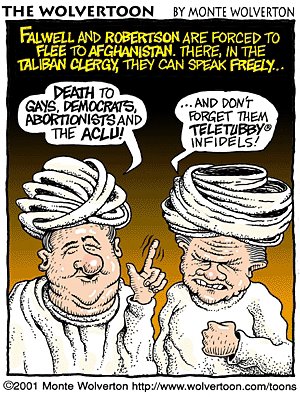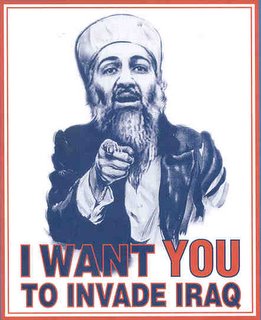
http://www.salon.com/news/feature/2005/11/21/christmas/print.html
How the secular humanist grinch didn't steal Christmas
The right-wing crusade against the liberal "war on Christmas" is great for rallying the troops. Too bad the war doesn't exist.
By Michelle Goldberg
Nov. 21, 2005 | In 1959, the recently formed John Birch Society issued an urgent alert: Christmas was under attack. In a JBS pamphlet titled "There Goes Christmas?!" a writer named Hubert Kregeloh warned, "One of the techniques now being applied by the Reds to weaken the pillar of religion in our country is the drive to take Christ out of Christmas -- to denude the event of its religious meaning." The central front in this perfidious assault was American department stores, where the "Godless UN" was scheming to replace religious decorations with internationalist celebrations of universal brotherhood.
"The UN fanatics launched their assault on Christmas in 1958, but too late to get very far before the holy day was at hand," the pamphlet explained. "They are already busy, however, at this very moment, on efforts to poison the 1959 Christmas season with their high-pressure propaganda. What they now want to put over on the American people is simply this: Department stores throughout the country are to utilize UN symbols and emblems as Christmas decorations."
According to the JBS, this assault on yuletide iconography was "part of a much broader plan, not only to promote the UN, but to destroy all religious beliefs and customs." The pamphlet called on all Americans to fight back by informing department stores that those with improper ornamentation wouldn't be getting their business.
At the time, the campaign to save Christmas was not widely treated as a matter of great national import. The John Birch Society was generally regarded as a crank, far-right outfit whose paranoid conspiracy theories (it believed fluoridated water was part of an evil communist plot to poison America's brains) put it outside the pale of reasonable discourse. Staffers on the ultra-right 1964 Barry Goldwater campaign tried to prevent Birchers from volunteering because they carried the taint of extremism. The John Birch Society didn't have access to a major television network. But a lot has changed since then.
Last December, warnings about a war on Christmas -- a war whose central front was the nation's department stores -- once against emanated from the right, but this time, they were on national TV and talk radio. Fox News' Bill O'Reilly began running a regular segment called "Christmas Under Siege." "All over the country, Christmas is taking flak," O'Reilly declared on Dec. 7. "In Denver this past weekend, no religious floats were permitted in the holiday parade there. In New York City, Mayor [Michael] Bloomberg unveiled the 'holiday tree,' and no Christian Christmas symbols are allowed in the public schools. Federated Department Stores -- that's Macy's -- have done away with the Christmas greeting 'Merry Christmas.'" Instead, Macy's was using the malign phrase "Happy Holidays." Noting this, Pat Buchanan wrote, "What we are witnessing here are hate crimes against Christianity."
This year the war on Christmas canard has come early, and with it the latest opportunity for religious conservatives to cast themselves as the oppressed victims of secular tyrants. In October, Fox News anchor John Gibson published a book titled "The War on Christmas: How the Liberal Plot to Ban the Sacred Christian Holiday Is Worse Than You Thought," which envisions a vast conspiracy with tentacles reaching into many aspects of American life. "The plot to ban Christmas itself is anything but secret," writes Gibson. "It is embedded in the secular 'Humanist Manifesto' (in its three iterations from the American Humanist Association), in the philosophy of teaching of John Dewey, in the legal opinions of Laurence Tribe, in the rulings of the Ninth Circuit Court of Appeals on which sits the most liberal jurist in the land, Stephen Reinhardt, who is married to Ramona Ripston, the southern California ACLU executive director and the national group's most liberal and effective leader."
As the holidays approach, the right is making ever more fevered preparations to thwart this ostensible conspiracy. Last week, the Catholic League for Religious and Civil Rights launched a short-lived boycott of Wal-Mart, charging the megastore with "insulting Christians by effectively banning Christmas." The American Family Association called for a Thanksgiving-weekend boycott of Target because of the chain's purported refusal to use the phrase "Merry Christmas" in its advertising. (Target denies having such a policy.) A few days later, Jerry Falwell announced he was joining with the Christian right legal group Liberty Counsel's "Friend or Foe Christmas Campaign," which intends to sue officials who try to curb religious Christmas celebrations in schools or other public places. According to the San Francisco Chronicle, "The 8,000 members of the Christian Educators Association International will be the campaign's 'eyes and ears' in the nation's public schools. They'll be reporting to 750 Liberty Counsel lawyers who are ready to pounce if, for example, a teacher is muzzled from leading the third-graders in 'Hark! The Herald Angels Sing.'" Meanwhile, the Alliance Defense Fund, a Christian right legal outfit co-founded by James Dobson, has ramped up its three-year-old "Christmas project," organizing over 800 lawyers to defend the sacred holiday. "It's a sad day in America when you have to retain a lawyer to wish someone a merry Christmas," says Mike Johnson, senior legal counsel for ADF.
Despite Johnson's lamentations, one can in fact offer Christmas greetings without legal counsel. Christmas trees are permitted in public schools. (They're considered secular symbols.) Nativity scenes are allowed on public property, although if the government erects one, it has to be part of a larger display that also includes other, secular signs of the holiday season, or displays referring to other religions. (The operative Supreme Court precedent is 1984's Lynch v. Donnelly, where the Supreme Court ruled 5-4 that a city-sponsored Christmas display including a crèche, reindeer, a Christmas tree, candy-striped poles and a banner that read "Seasons Greetings" was permissible. "The display is sponsored by the city to celebrate the Holiday and to depict the origins of that Holiday," the majority wrote. "These are legitimate secular purposes.") Students are allowed to distribute religious holiday cards and literature in school. If the administration tries to stop them, the ACLU will step in to defend the students' free-speech rights, as they did in 2003 when teenagers in Massachusetts were suspended for passing out candy canes with Christian messages.
In fact, there is no war on Christmas. What there is, rather, is a burgeoning myth of a war on Christmas, assembled out of old reactionary tropes, urban legends, exaggerated anecdotes and increasingly organized hostility to the American Civil Liberties Union. It's a myth that can be self-fulfilling, as school board members and local politicians believe the false conservative claim that they can't celebrate Christmas without getting sued by the ACLU and thus jettison beloved traditions, enraging citizens and perpetuating a potent culture-war meme. This in turn furthers the myth of an anti-Christmas conspiracy.
"You have a dynamic here, where you have the Christian right hysterically overrepresenting the problem, and then anecdotally you have some towns where lawyers restrict any kind of display or representation of religion, which is equally absurd," says Chip Berlet, a senior analyst at Political Research Associates and one of the foremost experts on the religious right. "It's a closed loop. In that dynamic, neither the secular humanists or the ACLU are playing a role."
The myth of the war on Christmas has two parts. The first, echoing the John Birch Society, charges that department stores are trying to replace the celebration of Jesus' birthday with some secularized, universal winter holiday season, a switch encompassed by the godless greeting "Happy Holidays." The second asserts that the ACLU and other groups like the Anti-Defamation League and People for the American Way are trying to ban public Christmas displays. Like all conspiracy theories, there are a few grains of truth at the center of it -- some schools, in an overzealous attempt to promote inclusiveness, have taken silly steps like renaming their Christmas trees "friendship trees." Some have indeed infringed on religious students' First Amendment rights. Weaving these stories together, the myth of the war on Christmas claims that the ACLU has forced Christmas into hiding, and that Christians must therefore battle to reclaim their rightful place in the culture.
"Those who would ban Christmas and Christians should not mistake the signs on the horizon," writes Gibson in "The War on Christmas. "The Christians are coming to retake their place in the public square, and the most natural battleground in this war is Christmas."
Gibson's colleague O'Reilly seems to have made it his special mission to crusade against the phrase "Happy Holidays." On Nov. 9, he presented an "investigation" into department stores that don't use the phrase "Merry Christmas." Sears/Kmart, he reported, had a banner on its Web site that, rather than openly proclaiming Christmas, said, "Wish Book Holiday 2005." "They were the worst we had to deal with," O'Reilly said after the company's spokesman refused to answer questions about their Christ-free Web site.
"I think the backlash against stores that don't say 'Merry Christmas' is enormous because now people are aware of the issue," he continued. "I know everybody's hypersensitive about are they going to say 'Merry Christmas'? Are they going to say 'Happy Holidays'? They're hypersensitive. And when you walk into a secular environment, most Christians are looking around, and they're really aware of it."
This, in fact, might be true -- having heard that the bland phrase "Happy Holidays" is part of a war against Christmas, some shoppers may be especially attuned for signs of subtle seasonal disrespect. On Nov. 11, a woman sent an e-mail complaining about the use of the phrase "Happy Holidays" at Wal-Mart and received a reply from a cheekily impertinent customer service employee that seemed to confirm the right's worst fears. "Santa is also borrowed from the Caucuses (sic), mistletoe from the Celts, yule log from the Goths, the time from the Visigoth and the tree from the worship of Baal. It is a wide wide world," the Wal-Mart worker wrote. In response, the Catholic League for Religious and Civil Rights launched its boycott, claiming Wal-Mart had "banned" Christmas. Wal-Mart quickly fired the offending employee and apologized. The boycott was called off, but the right remains unhappy about the store's continuing use of "Happy Holidays," leaving open the possibility of more teapot tempests as the Christmas season progresses.
Claims that Wal-Mart, of all places, is trying to ban Christmas resonate with some segments of the right because they're part of a larger, older story line about a giant, diabolical plot to rob God-fearing Americans of their traditions and erode their very identity. "The wagers of this war on Christmas are a cabal of secularists, so-called humanists, trial lawyers, cultural relativists, and liberal, guilt-wracked Christians -- not just Jewish people," Gibson writes. Also involved are mainline churches whose congregants "vote for John Kerry, Ted Kennedy, and Barney Frank. They are liberal by definition, and they proclaim their liberal values; I began to connect the dots and discerned the outlines of the conspiracy."
Gibson, of course, is not the first to connect the dots. The John Birch Society wasn't, either. As the Web site News Hounds pointed out last year, Henry Ford was sounding the alarm about the war on Christmas in his notorious 1921 tract "The International Jew." "The whole record of the Jewish opposition to Christmas, Easter and other Christian festivals, and their opposition to certain patriotic songs, shows the venom and directness of [their] attack," Ford wrote. He listed local outrages: "Christmas celebrations or carols in Philadelphia, Cincinnati, St. Paul and New York met with strong Jewish opposition ... Local Council of Jewish Women of Baltimore petitions school board to prohibit Christmas exercises ... The Council of the University Settlement, at the request of the New York Kehillah [Jewish leadership], adopts this resolution: 'That in the holiday celebrations held annually by the Kindergarten Association at the University Settlement every feature of any sectarian character, including Christmas trees, Christmas programs and Christmas songs, shall be eliminated.'"
To compare today's "war on Christmas" demagogues to Henry Ford is not to call them anti-Semites. Rather, they are purveyors of a conspiracy theory that repeatedly crops up in America. The malefactors change -- Jews, the U.N., the ACLU -- but the outlines stay the same. The scheme is always massive, reaching up to the highest levels of power.
In order to prove this conspiracy, Gibson, O'Reilly and others like them gather anecdotes from around the country of officials putting petty restrictions on the speech of aggrieved Christians. Some of these are exaggerated, some legitimate, but none support their paranoid claims of a vast secular-humanist conspiracy. Just as O'Reilly said, Faith Bible Church's religious float was indeed turned down for Denver's parade of lights -- since the parade is only an hour long, its organizers don't include any religious floats because they can't include all of them and don't want to show favoritism. Federated Department Stores did start using "Happy Holidays" in its national promotions, but left local stores free to use the phrase "Merry Christmas" in their advertising. In a statement responding to the war on Christmas hype, Federated wrote, "Our stores recognize and celebrate Christmas in a variety of ways, including Christmas decorations, Christmas music, Christmas-themed merchandise and Christmas trim-a-tree shops. And since our employees are free to wish any customer a Merry Christmas, you will frequently hear such expressions of holiday cheer in our stores as part of celebrating the season." Whether or not one agrees with these policies, they are not part of a campaign, a plot or a war. (If anything, they demonstrate that American business, hardly a bastion of godless communism or secular humanism, always plays it safe.)
The right's melding of concrete documentation and wild speculation is common to conspiracy theorists; as Richard Hofstadter wrote in his classic essay "The Paranoid Style in American Politics," "The typical procedure of the higher paranoid scholarship is to start with such defensible assumptions and with a careful accumulation of facts, or at least of what appear to be facts, and to marshal these facts toward an overwhelming 'proof' of the particular conspiracy that is to be established."
Not surprisingly, fair-minded outsiders who weigh the same facts come to quite different conclusions.
Charles Haynes, a senior scholar at the First Amendment Center and the author of "Finding Common Ground: A Guide to Religious Liberty in the Public Schools," is one of the heroes of Gibson's book. Gibson writes about how he resolved a crisis that arose in Mustang, Okla., when, fearing a lawsuit, the superintendent of schools ordered a nativity scene cut from an elementary school Christmas pageant, infuriating many in the town. Haynes was eventually flown out to mediate. He had, writes Gibson, "made something of a career out of rushing in as if he were driving an ambulance, lights flashing and sirens blaring, after schools had made disastrous policy decisions on restricting religious liberty in schools."
According to Haynes, though, there is no war on Christmas. "I certainly wouldn't put it that way," he says. "The big picture is that there's more religion now in public schools than ever in modern history. There's no question about that. But it's not there in terms of the government imposing religion or sponsoring it, and that bothers some people on the right. They miss the good old days when public schools were semi-established Protestant schools."
In the last two decades, says Haynes, "religion has come into the public schools in all kinds of ways ... many schools now understand that students have religious liberty rights in a public school, so you can go to many public schools today and kids will be giving each other religious literature, they will be sharing their faith. You go to most public schools now and see kids praying around the flagpole before school."
The reason fights over Christmas iconography recur, says Haynes, is that "there are still some school administrators who are so afraid to deal with religion that they go too far in keeping it out, and it only takes a few bad stories in this era of the Internet for many conservative religious people across the country to think that public schools are hostile to their faith."
Ironically, when school officials do go too far, the ACLU is likely to challenge them, on the grounds that the government can neither promote nor restrict religious speech. "A lot of the things the ACLU does to help religious people and religious students are not high-profile cases; they don't get much attention," says Haynes. "The Christian student who is told she can't bring her Bible to school, the ACLU gets those kinds of calls, and often it doesn't become a lawsuit, but they will quietly tell the school you can't do this, you have to treat everyone fairly."
Indeed, one case that ACLU president Nadine Strossen loves to talk about is that of Rita Warren, a retired woman who calls herself the "Lone Ranger of the manger" and whose life mission is to put nativity scenes in public places. When she placed a plastic crèche on the lawn in front of the government building in Fairfax, Va., the government ordered her to remove it. Warren called the ACLU, and they discovered that the city of Fairfax had allowed others to erect displays on the property. "Once the government allows displays of any kind to be placed on public property, it can't then discriminate against some display because of the viewpoint," says Kent Willis, executive director of the ACLU of Virginia. "The government could not discriminate against her religious display any more than it could take specific action to promote her religious display. It has to treat us the same."
These stories rarely get much play, especially since the ACLU lacks a publicity apparatus that can compete with the religious right. "We're not in the business to defend ourselves as an organization," says Strossen.
Mike Johnson of the Alliance Defense Fund knows about the Warren case, but he dismisses it. "They always use this -- it's like their get out of jail card. This one case cannot change 80 years of history." Throughout those 80 years, he says, the ACLU's "ultimate and underlying agenda is to silence people of faith. They do not want God mentioned in the public square. If they could completely censor that out, they would ... The ACLU has a pretty sordid past. They were founded by a guy, Roger Baldwin, who was an avowed atheist, and he had a certain agenda. He wrote about being a socialist, and communism was his goal."
But Americans are catching on to the ACLU's malign influence and fighting back, says Johnson. Johnson's boss, ADF president Alan Sears, has just co-written a book with Craig Osten titled "The ALCU vs. America." The ACLU and its allies, they write, "terrorize local communities on an almost daily basis with letters, e-mails and telephone calls to silence Christmas and other religious activity." But the terrorists can be beaten: "It will take sacrifice, perseverance, and a concerted effort by millions of Americans to defeat the ACLU, its many allies, and their agenda. But with God's grace, we are confident it can and will be done."
As Johnson notes, O'Reilly invited Sears onto his show to talk about his book, catapulting it to No. 20 on Amazon. "You can only push the American people so far, and then there's a backlash," Johnson says. "The ACLU in recent years has just pushed Christian America to the limit. From its earliest stage, the ACLU has deliberately chipped away at the legal and moral and religious foundations of our republic."
The war on Christmas trope lets the right pretend to be playing defense when it's really on the offensive -- against the ACLU, separation of church and state, and pluralism, to name just a few targets. "The revolution against Christianity has been under way for a few years," writes Gibson, "and now the counterrevolution is gearing up."
-- By Michelle Goldberg





